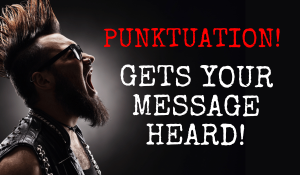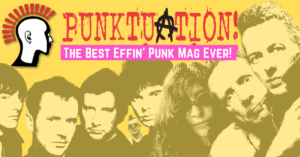From Black Flag to Dead Kennedys, Agnostic Front to Anti-Flag, punk bands have a long history of kicking against the boys in blue
Anti-authority to the core, punk presented a challenge to those in charge almost as soon as the Sex Pistols reared their heads to kick-start the UK punk scene. Banning gigs and making arrests, the state and its forces quickly made their feelings known about this new music, and punk’s been calling out police brutality and racism ever since.
And it just doesn’t stop as the rightwing attackers in the deadly US Capitol riot earlier in the month proved.
When it emerged off-duty police officers, and military members were among the rioters, Rage Against the Machine guitarist Tom Morello was moved to quote his band’s timeless song Killing in the Name.
Police on their backs
The story starts in 1976, but not in New York. The Big Apple may have earned its place as the cradle of punk, with bands like the Ramones, Television and New York Dolls, but it was the UK that birthed politicised punk.
Leading the charge were the Sex Pistols. Their debut single Anarchy in the UK began scaring the establishment on its release in 1976 and the following year saw the crack-down on the band begin in earnest.
A London boat trip on the Thames to mark the release of their 1977 single God Save the Queen ended in farce, with the police forcing it to dock and several arrests made, including manager and Svengali Malcolm McLaren for “using insulting words likely to provoke a breach of the peace”.
God Save the Queen was duly banned by the BBC and the aptly named Never Mind the Bans tour of Britain saw a number of dates cancelled after political pressure. Eventually, the police tactics worked. “I left because of police harassment,” John Lydon said of his decision to quit the Pistols and form Public Image Ltd (PiL).
The Clash also regularly suffered from police pressure, something they challenged through their music – though with more of a tuneful-talking-to than a scream of rage.
Covers abounded, with recordings of Junior Murvin’s reggae classic Police and Thieves, the Bobby Fuller Four’s I Fought the Law and The Equals’ Police on My Back. They also gave voice to their own experiences, with Guns on the Roof partly inspired by an armed anti-terrorist squad raid on the Clash’s Camden Market base.
As Joe Strummer noted: “Authority is supposedly grounded in wisdom, but I could see from a very early age that authority was only a system of control and it didn’t have any inherent wisdom.”
The band highlighted that control in their artwork, setting an enduring punk trend. Charging police officers from the 1976 Notting Hill Carnival riot appear on the back cover of their debut album and the front cover of their Black Market Clash compilation shows Don Letts facing off ranks of police.
“Authority is supposedly grounded in wisdom, but I could see from a very early age that authority was only a system of control and it didn’t have any inherent wisdom.” Joe Strummer
Tweet
But among the early UK punk bands, it was The Ruts that pointed the way for subsequent generations of punk, by getting more pissed off and more specific.
The scathing S.U.S., from debut album The Crack, tackles the London police’s misuse of ‘stop and search’ powers, while third single Jah War was about police violence at a 1979 anti-racism demonstration.
Hardcore punk police stories
Hardcore took its inspiration from the first wave of US and UK punk, but make it faster and tougher. It’s attitude to the police followed suit. And one band was at the forefront of this.
“Police harassment blighted the early days of South Bay hardcore, and Black Flag was the lightning rod for most of it,” wrote Michael Azerrad in his book Our Band Could Be Your Life.
“Between 1980 and 1981, at least a dozen Black Flag concerts ended in violent clashes between the police and the kids. And the more the band complained to the press about the police, the more the police hassled them and their fans.”

The message in Police Story was pretty clear: “We hate them, They hate us/We can’t win, No way”. An early song in the band’s repertoire, guitarist and main man Greg Ginn liked it so much he recorded it all the singers in the band’s classic 80s line-ups, including Henry Rollins.
“I grew to hate the police quickly,” as Rollins put it in Get in the Van, his account of life on the road with Black Flag. “All the bullshit they got up to was so out of line. They did what they wanted with punk rockers. They did stuff at our shows that they could have gone to jail for. It was an eye-opening experience.”
“I grew to hate the police quickly. All the bullshit they got up to was so out of line. They did what they wanted with punk rockers.” Henry Rollins
Tweet
Dead Kennedys approach was, as usual, to skewer some of that bullshit with a healthy dose of satire in Police Truck.
“Tonight’s the night that we got the truck/We’re going downtown, gonna beat up drunks,” Jello Biafra sings, from the point of view of a gang of police officers.
But satire wasn’t the rule, and Dicks, a hardcore band from Texas, were pretty straightforward with their song Dicks Hate the Police.
And where to start with MDC? Also formed in Texas, the meaning of the band’s name is most frequently given as Millions of Dead Cops and their songs included Dead Cops and No More Cops.
Back on this side of the pond, the younger punk bands that made up the UK82 street punk scene (also known as UK hardcore, second-wave punk or No Future punk) were similarly pissed off. The likes of Angelic Upstarts, Cockney Rejects, Discharge, Oi Polloi and The Partisans (another band singing their Police Story), were just some of those tackling police violence and oppression.
Fuck Police Brutality
Abuse of S.U.S. powers in ’70s Britain and LA cop violence in the 1980s were hardly outliers, and in the years since Black Flag told their police story many awful cases of police abuse of power have fuelled some great punk music.
Starting as they meant to go along, Anti-Flag’s 1996 debut, Die for the Government, included not one but two withering looks at the situation – Fuck Police Brutality and Police State in the USA.
Vocalist and bassist Chris #2 explained: “Anti-Flag had a song called ‘Fuck Police Brutality’ in 1996, because when [we] played punk shows, cops were mean to us. You extrapolate that to the reality of 2019 and ’20, and cell phone cameras, and all the things that we’re seeing, you’re then able to go like, ‘Oh, fuck’.”
The 1990s also saw the Offspring’s second album, and first for Epitaph Records, call out the L.A.P.D on the song of the same name: “The L.A. story’s gone way out of hand/Their acts of aggression, they say they’re justified/But it seems an obsession has started from the inside”. It was recorded just a year after Rodney King’s savage beating by L.A.’s ‘finest’ and the riots that followed.
Meanwhile, hardcore pioneers Agnostic Front told the then New York mayor, and current Trump lapdog, Rudy Giuliani what they thought of him in Police State, the lead track from their 1999, Lars Frederiksen-produced album Riot, Riot, Upstart.
“Giuliani, Giuliani, Giuliani, fuck you!” Police State Lyrics, Agnostic Front
Tweet
Riot police feature on album artwork for Pennywise’s 2001 Land of the Free? where Fuck Authority takes issue with lies and domination. Amazingly, the song was released as a single and sent to radio stations in May 2001. It’s not known how much airtime it received, but it did lead to a free show being banned.

“I’ve always had a huge problem with authority, especially the police. If you were a punk rock kid they were always after you. I think it’s still true today,” guitarist Fletcher Dragge said in 2005.
Going from slogans to the specific were Le Tigre. Fronted by Bikini Kill singer Kathleen Hanna, their 2001 song Bang! Bang! denounces the killings by the NYPD of the unarmed Patrick Dorismond and Amadou Diallo. It ends with a count to 41 – for each of the bullets that struck Diallo as he stood in the vestibule of his own Bronx apartment building.
Public service announcements, with guitars
Murder’s still a crime and every punk generation has bands that can say they fought the law. Today they include Bob Vylan, War on Women and The Suicide Machines.
Sadly, there’s been no shortage of inspiration over the last decade for punk’s amped-up condemnations. And in the US, where police shootings of unarmed black people occur seemingly like clockwork, police departments are currently opening inquiries as to whether their members took part in the US Capitol riot.
It seems that punk will have a police problem for as long as the police have a violence problem. As the May 2020 death of George Floyd showed, The Clash have yet to be proved wrong:
“You have the right not to be killed … unless it was done by a policeman.”
Dom Tyer is a journalist and writer. He blogs at A Tangle Of Wires and is @tangleofwires on Twitter, where he also runs an account for London punk and hardcore shop All Ages Records.
An occasional writer on punk rock.
Click on Dom’s photo for more of his articles




 Did you know that we are 100% DIY? We run our own game. No one dictates to us, and no one drives what we can or cannot put on our pages – and this is how we plan to continue!
Did you know that we are 100% DIY? We run our own game. No one dictates to us, and no one drives what we can or cannot put on our pages – and this is how we plan to continue!
